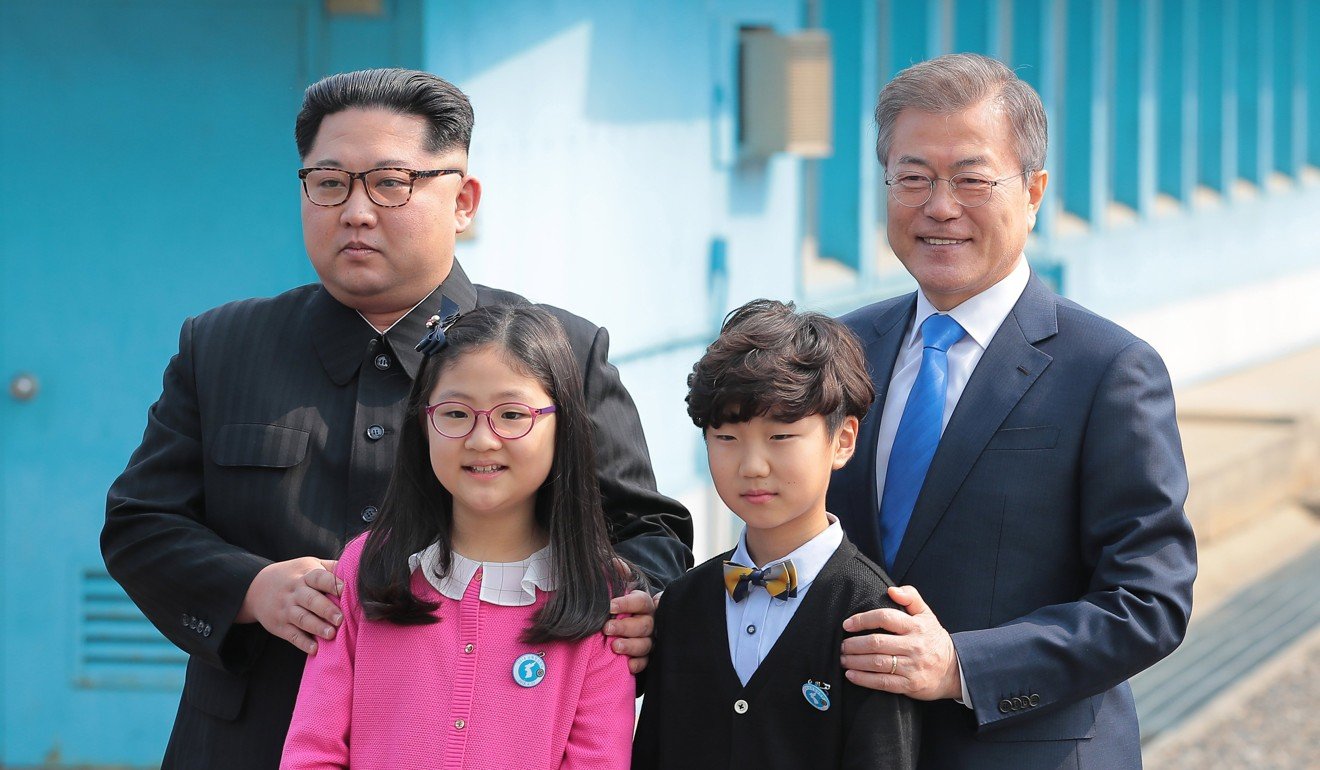
North and South Korea pledge to end all hostilities and work for nuclear-free peninsula
Statement wraps up historic summit with promise to eliminate risk of conflict and work with international community, but analysts say it lacks details
Leaders of the two Koreas wrapped up a historic summit on Friday with a pledge to end their six decades of hostility, vowing to commit to peace and “complete” denuclearisation of their divided peninsula and eventually achieve unification.
Kim Jong-un became the first North Korean leader to walk across the demarcation line and set foot in the south – where he was greeted by South Korean President Moon Jae-in – since the Korean war in 1953.
The two Koreas issued a declaration pledging to work together for a “nuclear-free Korea”, disarmament, as well as officially ending the war following two sessions of meetings between the two leaders in the fortified border village of Panmunjom.
The declaration contains many pledges, including taking steps to prevent accidental military conflicts, and to cooperate with the international community to achieve a nuclear-free peninsula.
The document also promises mutual disarmament “in a phased manner” to build trust.
The United States, China and Russia welcomed the agreement, but analysts cautioned against the lack of a roadmap or details in the declaration.
US president Donald Trump tweeted: “After a furious year of missile launches and nuclear testing, a historic meeting between North and South Korea is now taking place. Good things are happening.”
China praised the positive outcome from the summit meeting and said it was willing to continue to play an active role in the process.
“We hope all parties can keep the momentum of dialogue, push forward together for the denuclearisation of the peninsula and the political resolution process,” foreign ministry spokesman Lu Kang said.
The declaration highlighted as “very meaningful and important” North Korea’s announcement last week to close down a missile launch centre and stop nuclear tests.
“The South and the North have agreed that the main measures taken by North Korea are very meaningful and important measures for the denuclearisation of the Korean peninsula, and agreed to fulfil their responsibilities and roles,” the declaration said.
The two leaders also agreed that Moon would visit Pyongyang in the autumn.

An inter-Korean joint liaison office will also be set up in the North Korean town of Gaeseong “to ensure smooth exchange and cooperation”, while family reunions of people from the two sides will also resume, it said.
The leaders also agreed to stop all “hostile acts”, including loudspeaker broadcasts and leaflet drops, in the demilitarised zone from May 1.
The two sides will work together to officially end the Korean war this year, which was halted by an armistice signed in 1953, either through trilateral talks between the two Koreas and the US, or four-party talks including China, to establish a permanent peace agreement.
Under joint declarations made at the two previous inter-Korean summits, in 2000 and 2007, the two Koreas agreed to ensure peace on the peninsula, encourage economic cooperation, boost infrastructure and provide preferential treatment. But tensions have escalated since Kim Jong-un took power in 2011.
The atmosphere between Kim and Moon appeared congenial on Friday, with warm handshakes, an embrace and quiet talks as the two took a stroll along the border together after a tree-planting ceremony near the military demarcation line in Panmunjom. They announced the declaration together at the entrance to the Peace House, in the southern part of the Joint Security Area.
With no formal peace agreement in place after the Korean war “ended” in 1953, there have been various military engagements between the two sides since – including an assassination attempt on then South Korean president Park Chung-hee in 1968, the murder of two US Army officers in the DMZ in 1976, and the bombing of Korean Air Flight 858 in 1987.
Tensions continued despite a “reconciliation, non-aggression and exchanges and cooperation” agreement in 1992, as it was not legally binding.
While Friday’s declaration appears to signal a new era in Korean history, sceptics say it lacks detail and there is no specific roadmap for the “complete, verifiable and irreversible” dismantling of North Korea’s nuclear weapons sought by Washington.
Paul Haenle, director of the Carnegie-Tsinghua Centre for Global Policy in Beijing, said that the declaration “did little to pave the way for denuclearisation”.
It “used a recycled language [and doesn’t] contain any tangible or verifiable commitments from the North. This puts greater onus for such commitments to be made by a Trump-Kim meeting or potential quadrilateral meeting with the two Koreas, US and China”, Haenle said.
South Korean politician Hong Joon-pyo, head of the opposition Liberty Korea Party, said that peace talks without specifics on nuclear dismantlement would be a “total catastrophe”.

Japanese Prime Minister Shinzo Abe meanwhile urged Pyongyang to take “concrete action” on denuclearisation.
Some observers expect China to play a role in pushing North Korea to take these actions, and establish permanent peace on the peninsula.
“China should intervene in the denuclearisation [process],” said Cai Jian, an expert on Sino-North Korean relations at Fudan University in Shanghai, noting that Beijing was a party to the 1953 armistice agreement.
“The expected peace treaty, which will aim to replace the ceasefire, will lose legitimacy without Beijing’s endorsement,” Cai said.
Lee Soo-hyuck, a former head of Seoul’s delegation to the six-party talks, also acknowledged China’s role in the Korean peninsula negotiations.
“China’s involvement in the upcoming talks is very important,” Lee said. “China still has influence over the North and should be invited to [any future] talks [for peace on the peninsula].”



